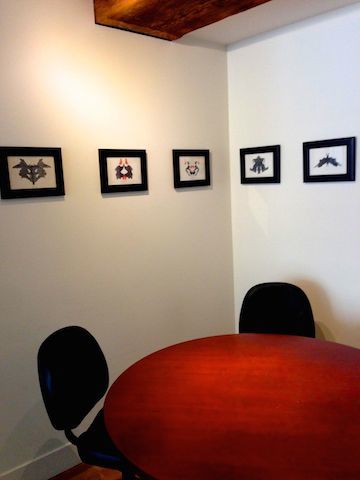Stefan On Hiring
ON HIRING
Dr. Larry Stefan is an Industrial/Organizational Psychologist and President of one of Canada’s top selection & assessment firms. As such, he is a leading expert in the hiring process.
Your Hiring
** Based on this interview with Dr. Stefan, chart out a Hiring Plan that will make your hiring process as valid and reliable for your venture as possible.
The Interview
1. You’re a successful entrepreneur yourself. Can you tell us a bit about your company?
Stefan, Fraser & Associates was formed at the end of 2012 when I purchased our collegial competitor, AW Fraser & Associates and changed the company name, L. Stefan & Associates (started in 1991), to one that included both companies’ names, Stefan, Fraser & Associates, Inc., or SFA for short. We are group of industrial/organizational psychologists who work, broadly speaking, in the area of individual differences and specifically how this relates to leadership and management practices in organizations. We are also experts in psychometrics and design, validation, and monitoring company-wide selection systems. Our main office is in Vancouver and we also have an office in Edmonton. In addition to SFA, I am the main seed money in an internet-based start-up company called Sokanu, a site for free career planning and human analytics for candidate screening and hiring. (If Sokanu is successful, it will put SFA out of business!)
2. If you were starting a new business in a totally new field and about to hire your first employee, what are some important questions you’d ask yourself before doing so?
In adding people to my new business, I first need to ask what am I good at and do well but also what am I not good at or have no interest in doing. Typically, entrepreneurs are good at creative ideas that ‘disrupt’ traditional businesses. However, they may not be particularly good at details and follow through or dealing with the financial/accounting aspects of running a business. However, I would not suggest that an entrepreneur’s first hire should be someone who is opposite of themselves or has a complementary skill set. At the start-up phase of a business, passion and energy for the core product or service are likely more important than complementary skills.
Many business processes, such as accounting, can be farmed out, so to speak. As the business grows, then selecting employees who complement your skills and abilities may be more important. When hiring, new business owners need to make sure they know what is expected of the person. Preparing as much as possible a detailed job description and performance expectations for both the owner and the new hire are critical. As the business becomes more established, this can be very important. However, at the beginning of the business, owners should seek people who share their passion and are willing to do anything to make the business successful.
3. What are some potentially dangerous yet common hiring myths?
One myth is that hiring someone with experience is better than hiring someone with little or no experience. Why is this a myth? Everyone typically has some sort of work experience. However, just because they have done something does not mean they are particularly good at it. It is often better to hire for underlying aptitudes and attitude for doing a job than experience.
4. What are the most common hiring mistakes you see in the hiring processes of small business/entrepreneurs?
There are many hiring mistakes. One of my favourites involves hiring based on a first impression or ‘gut feeling’. This approach to hiring is likely akin to hiring someone on the basis of whether or not they are likeable as a friend or neighbour rather than their ability to do a specific job.
Another mistake that people sometimes make is believing they need to hire NOW and the particular candidate they just saw is the best they can get in the market. This often results in a mediocre hire, which creates its own problems down the road and increased turnover. Business owners need to take the time to hire well the first time around
5. What are some critical steps that even the most time and money-crunched entrepreneurs should take as they go about hiring their staff?
The most critical steps in hiring involve knowing what role you are hiring for, what skills and competencies are needed to be successful in this role, and being clear to the candidate and yourself about performance expectations.

A Stefan Fraser Testing Room. The Rorschachs are just used as artwork here!
6. How has the hiring process changed as technology and the Internet have evolved?
Technology has significantly affected hiring practices, mostly for the positive, in my opinion. LinkedIn and other social connection platforms facilitate job searches and hiring practices. In addition,candidate testing on almost any conceivable human performance dimension is available through online testing (although validity and accuracy of testing is often still lacking). Many candidates can be quickly screened and further winnowed with short Face Time or Skype interviews. In general, the process of candidates finding suitable employment has become more fluid and efficient.
7. What are some of the deepest traps that companies fall into with their interview processes?
A typical interviewing trap that companies often fall into is for everyone on the management team to interview the candidate separately using the same standardized interview. This means that sometimes a candidate goes through essentially the same interview five or six different times with the result that the company is no wiser for its efforts.
It would be much better for two or three people to do one standardized interview as a group, to carefully review their observations and candidate’s ratings on the necessary competencies immediately after the interview, and then to pass the candidate on to other people in the organization to evaluate them under different venues, such as going for lunch or a tour of the facility, or having a discussion with them about the company and its future. The candidate needs to be seen in different situations and careful observation conducted to develop an accurate and holistic perspective of the person’s abilities and potential to contribute.
8. Are there any specific questions that you wish people would just stop asking in job interviews. Why?
Most interviewers tend to ask very typical questions, such as “What are your strengths and weaknesses?” I think such questions are fine. The candidate expects them and they allow them to speak about themselves in a somewhat prepared manner, thus reducing their anxiety. Any question could be a good question depending on the candidate and circumstances, but questions unrelated to job competencies, such as, “What is your favourite movie? …or hobby?” are not likely to add much value. The art of interviewing is being able to understand what you are hearing and then exploring a candidate’s answers further.
9. In what sort of circumstances would you recommend that new businesses commission more in-depth, psychological assessment of job candidates? Why then?
In-depth psychological assessments are expensive and many small start-up companies cannot afford them. Nevertheless, seeking assistance from an industrial/ organizational psychologist may be one of the best expenditures the company makes in its early days. Each employee hired at the start of the business can significantly add or detract from its success. Usually there is something that an I/O psychologist can provide that can be cost-effective and shed important light on some aspects of a candidate’s abilities.
10. Are there certain overall personal qualities that you think are desirable for early hires in a growing start-up?
Passion and motivation, but also intelligence. There is no use in hiring the smartest person in the world if he/she is lazy. However, without a keen intellect, the passion and motivation may be easily misdirected or even do harm to the company.
11. In your experience, have you found that certain personal qualities are particularly useful for Founders about to tackle the ups and downs of a new business?
Yes, entrepreneurs generally tend to have some defining characteristics. These include self-confidence, creativity, risk-taking, and high energy and motivation. They also need to be emotionally resilient to be able to handle the seemingly endless disappointments of things not unfolding as they expected. The ability to reflect on your own behaviour and know what you can leverage or need to compensate for versus pure persistency typically determines who will be successful when all other factors are equal.
12. What would you advise for Founders who just cannot decide between two candidates who seem equally appealing?
If a founder finds two candidates that appear equal keep assessing! It is highly unlikely that two candidates are exactly the same on the various dimensions you may need. However, you may find two candidates that are equally qualified on every competency dimension needed. You can use intelligence and motivation as a tie-breaker. Because great talent is so hard to find I have seen clients hire two finalists. Big organizations will sometimes ‘make a home’ for a worthy ‘surplus’ candidate knowing they can utilize the second candidate in come capacity, especially if they are growing. Small startup companies can rarely afford to do this.
13. Anything else you would add about hiring or selection for the entrepreneur?
Seek professional help if you are not sure what you are doing! It could make the difference between the launch of a successful company or a flop.

Entrepreneur Stefan celebrates seed money with his bet on the future: Spencer Thompson, CEO of Sokanu


